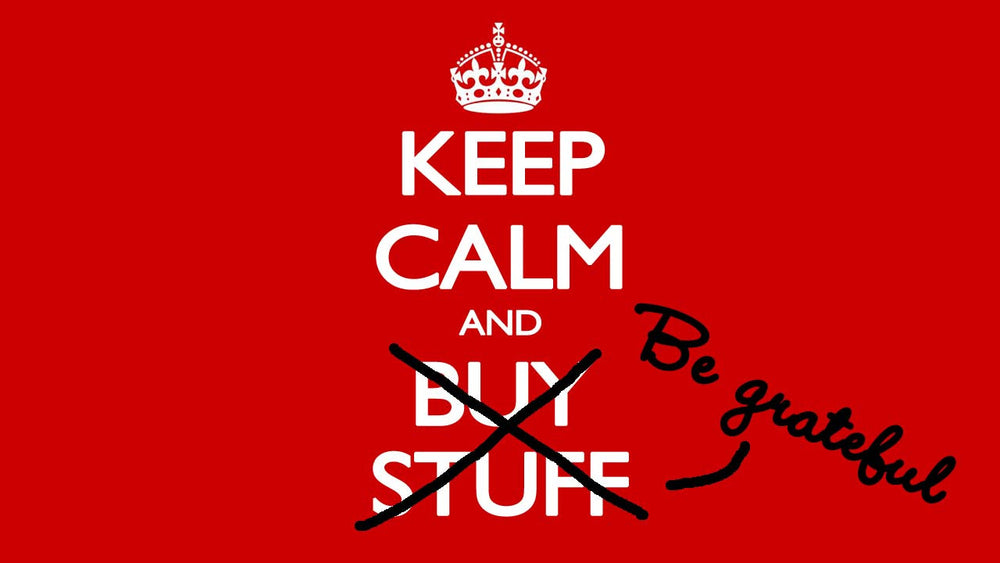
There is one sentence in the English language guaranteed to trigger a stress response in my body and a friend said it to me the other day. ‘There are just four weeks until Christmas.’ I instantly felt panic rising in my body with thoughts like ‘I haven’t bought any presents,’ ‘There goes my diet,’ and ‘Here come the late nights.’
To me, the modern version of the ‘Silly Season’ seems completely out of whack with the origins of many of the traditions that we celebrate. In the US, it starts with Thanksgiving and then the rest of the world joins in as office wrap parties collide with end of year deadlines and school concerts and we rush around buying things ultimately ending in holiday overindulgence. Just as we successfully navigate the emotionally charged political minefield of work and/or family politics, we hurtle straight into New Year celebrations and all the while, we’re bombarded with advertising encouraging us to buy more before it’s too late and buy even more during sales to rid the world of leftovers.
Since I’ve just released my film The Connection, which explores the latest research proving our mind and body are connected when it comes to our health outcomes, all this got me thinking about what this pending emotional mayhem does to our health. Not surprisingly, this week’s investigations have shown that the next few months can be terrible for our health, especially when we look at some of the research on materialism.
It seems that people who focus on the acquisition of material objects have lower levels of happiness, and higher levels of depressive symptoms. They are less satisfied with their standards of living, family lives, and the amount of fun and enjoyment they experience. The scary thing is that these elements are predictors of cancer, heart disease, diabetes and a host of other chronic illnesses.
And the holiday season marketing machine only adds fuel to the fire. In a series of studies, Professor Robert Arkin and his team from Ohio State University found that materialistic values can be inflamed by insecurity. They found that those who chronically doubt themselves and their own self-worth tend to be more materialistic. They also found that people could be primed to experience doubt and insecurity, which could lead to higher levels of materialism.
This research has led me to conclude what I had already suspected to be true – that despite all the holiday hype around me, buying those two-for-one packets of Christmas cookies (even if they are sugar, dairy, gluten and taste free) won’t actually make me any happier or healthier. No wonder my stress response was triggered by my friend’s seemingly harmless chitchat about the number of weeks before Christmas.
It seems to me that rather than being encouraged to appreciate each other (which is good for our health as I’ve written about here) or be present in the moment through mindfulness (which numerous studies have shown health benefits of), we are instead encouraged to fill any voids and deficiencies we may have by eating too much, drinking too much and buying too much. By the time late January rolls around, despite weeks of living life to excess, we are left exhausted, empty and poor.
The good news is that researchers are proposing an antidote. Gratitude.
The research on the health benefits of gratitude is utterly uplifting. There is an accumulation of scientific evidence showing gratitude improves our psychological, social and physical well-being. The work of Dr. Robert Emmons in particular has garnered a lot of attention for showing that cultivating gratefulness through journaling leads to overall improved well-being, including fewer health complaints and a more positive outlook toward life.
One study found that those who kept gratitude journals exercised more regularly, reported fewer physical symptoms, felt better about their lives as a whole, and were more optimistic about the upcoming week compared to those who recorded hassles or neutral life events.
Recently, researchers from Baylor University made a direct link between gratitude and materialism. In this study, they found that a focus on what you want makes it more difficult to appreciate what you already have. They found that people who were more materialistic felt less gratitude, which was associated with lower levels of life satisfaction.
So, in the face of the Silly Season shenanigans, when consumer culture is pushing us towards materialism, how do you increase your gratitude? Positive Psychology pioneer Dr. Martin Seligman from the University of Pennsylvania has a very simple technique we can all adopt. It’s called the Three Good Things exercise. Some people call it the Three Blessings. All we have to do is write down three good things that happened each day and why those things occurred. That’s it.
The research shows that people doing this exercise for one week increased happiness and decreased depressive symptoms for six months. I’ll say that again - one week of doing this exercise had a lasting effect for six months. I’ll be doing this exercise each night before I go to sleep during the Silly Season. Why not join me? I’ll know you when I pass you in the street because you’ll be the ones strolling along during the craziest time of the year with a smile on your face.
Further reading from other writers:
Would Your Life Be Better if You Owned More Things? If you shop on Thanksgiving you are part of the problem The Madness of Materialism Is Gratitude an alternative to materialism?





 My Year of Living Mindfully (DVD)
My Year of Living Mindfully (DVD) The Connection (DOWNLOAD-TO-OWN)
The Connection (DOWNLOAD-TO-OWN) My Year Of Living Mindfully - Book
My Year Of Living Mindfully - Book




